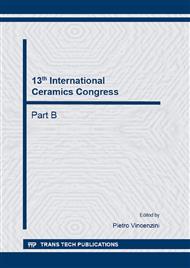p.43
p.49
p.54
p.60
p.65
p.70
p.74
p.80
p.85
3D Printing of Calcia-Based Ceramic Core Composites
Abstract:
Three-dimensional printing has been used as a rapid freeform fabrication process to fabricate a wider range of green ceramic components with complex structures difficult to obtain using traditional ceramic fabrication process. In this study, calcia-based ceramic core composites were fabricated by three dimensional printing and sintering operation. The green bodies were printed using a CaO/TiO2 powder mixture as a precursor material and ethylene glycol as a binder. They were sintered at 1400-1500 °C for 2 h. The phases and microstructures of these samples were characterized by X-ray diffraction and scanning electron microscopy. The effect of TiO2 content and the sintering temperature on the density, hydration resistance and bending strength of the sintered bodies was investigated. It was found that increment of TiO2 content and sintering temperature would result in an increase of density of the sintered bodies and then increase of hydration resistance and bending strength.
Info:
Periodical:
Pages:
65-69
DOI:
Citation:
Online since:
October 2014
Authors:
Keywords:
Price:
Сopyright:
© 2014 Trans Tech Publications Ltd. All Rights Reserved
Share:
Citation:


